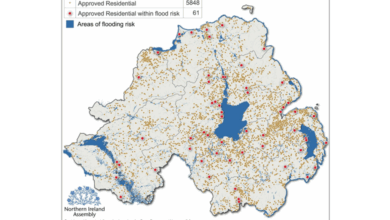Translink: Delivering high quality public transport

Translink delivers public transport services which impact on everyone in Northern Ireland, whether you use public transport or not, supporting economic, social and environmental wellbeing, writes Chris Conway, Translink Group Chief Executive.
We are passionate about providing high quality public transport, which not only enables Northern Ireland to thrive but also addresses the challenges of congestion and air quality, the largest environmental health risk in the UK.
Translink is helping to deliver on the 12 outcomes of the draft Programme for Government, improving wellbeing for all by tackling disadvantage and driving economic growth.
The last years have seen a growth in sustainable travel, building on the record passenger numbers of 2017/18, we’re delighted that we have attracted more than three million additional passenger journeys in 2018/19, rising to 84.5 million and taking over 2.8 million car journeys off our roads.
Last year saw the introduction of the flagship Glider service, linking east and west Belfast via the city centre, with services also running to Titanic Quarter. This service is an investment in modern public transport, an innovative, high-spec, low emission system helping to connect Belfast like never before.
Phase 2 of Glider, running north to south, has now been offered as part of the Belfast City Deal.
Ever-increasing passenger numbers mean that there’s a pressing need to increase investment and capacity across our infrastructure, and we need government support to do this.
The Belfast Transport Hub recently received planning approval. This is a major project which will transform public transport in Northern Ireland, creating a world-class transport interchange and surrounding master plan development at Weavers Cross, with imaginative mixed-use development proposals. As a transport-led regeneration project, the Hub is a hugely important Northern Ireland Executive Flagship Project, and will be a key driver of economic growth for the city and Northern Ireland. It is hoped to commence work on site in the coming months.
The Hub will provide a new main bus and rail connection point reaching out to every corner of Northern Ireland and beyond, providing additional passenger capacity. The proposed Weavers Cross master plan development will also present significant regeneration opportunities for Belfast.
In the North West, we are making strong progress with the North-West Multi-Modal Transport Hub, centred on the Grade-B listed Waterside Train Station in Derry~Londonderry. This facility will form the heart of a new, cross-border, multi-modal transport facility with the capacity to revolutionise travel in the North West. It will provide additional capacity and fuller integration with public transport services across the city and beyond, as well as acting as a major catalyst for development in the Waterside area. The project has received substantial funding from the European Union’s INTERREG VA programme, as well as significant match funding from the Department for Infrastructure and the Department for Transport, Tourism and Sport in Ireland. Phase 1 of the new facility is scheduled to open in late 2019, with attendant Phase 2 works completing in 2020.
Along the coast at Portrush, a new train station is being completed ahead of The 148th Open, taking place at Royal Portrush this summer. As part of a £17 million Portrush Regeneration Project led by the Department for Communities, this will replace the existing facility and will accommodate ever-growing passenger numbers passing through the coastal town during the all-important summer months, acting as the town’s gateway to the world during The 148th Open.
We also have some important plans for our services, with a planned Metro enhancement to be rolled out in Belfast over the coming months, which will help make Metro services in the city more efficient and streamlined, reinforcing its position at the heart of connecting Belfast. We will also continue to roll out Ulsterbus Urby services across greater Belfast over the coming months.
We’re also maintaining and enhancing services across the network, with new/replacement Goldline fleet due to be delivered this year, alongside major track relay works in Lurgan this summer in order to maintain overall performance and high safety standards on the vital Belfast-Newry rail corridor for both local and cross-border rail services. Other areas for focus include the extension of our park and ride capacity, building on the success of our recently opened facilities in Portadown and Black’s Road.
NI Railways urgently requires additional capacity on the network, and 21 new carriages are on order, fully compatible with our fleet of Class 4000 trains, providing around 1,400 extra seats to accommodate growing passenger numbers; these will begin to be delivered in 2021.
Delivering on the outcomes of the draft Programme for Government requires sustained investment in public transport infrastructure. Translink will continue to work with partners and stakeholders to deliver the investment required, ensuring Northern Ireland continues to develop and prosper. We want to encourage everyone in Northern Ireland to make public transport ‘your first choice for travel’, helping address the challenges of congestion and air quality, while contributing to social, economic and environmental wellbeing.
W: www.translink.co.uk
Twitter: @Translink_NI






